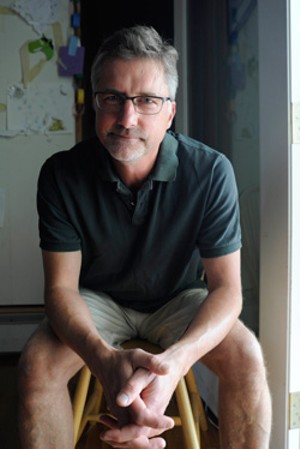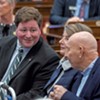Published September 4, 2013 at 6:16 a.m. | Updated October 30, 2018 at 2:25 p.m.
If you spend a lot of time online, you may have seen a Vermonter mentioned recently in a slew of click-bait headlines. “Harry Potter cast a spell on the U.S. to propel Barack Obama to Presidency twice, professor claims,” trumpeted the Daily Mail on August 15. “Harry Potter is why young people voted for Obama, professor says,” claimed msn Now.
For some reason, the right-leaning media seem to be taking to this Obama-Potter connection. One of the earliest accounts appeared in the College Fix, which bills itself as “Your Daily Dose of Right-Minded Campus News.” “Dark arts master Harry Potter to blame for Obama, claims professor,” was the none-too-subtle headline in the Daily Caller. And commenters on the Daily Mail piece reacted, as they are wont to do, by working themselves into a righteous lather: “Finally someone/something to blame for the FIASCO,” one reader wrote. Another: “And now you know why he’s in Vermont ... God forsaken place...”
“He” is presumably the study’s author, University of Vermont political science professor Anthony Gierzynski. And Gierzynski says he’s bemused by some of the attention his book — called Harry Potter and the Millennials: Research Methods and the Politics of the Muggle Generation — has garnered since it was published last May.
A conversation with the 51-year-old Montpelier resident reveals no sinister agenda to yoke Obama and Potter together in the public mind. Gierzynski does want to promote awareness that popular entertainment has political effects, though, and not just on Potter fans. Himself an avowed “big consumer of a lot of entertainment media” — including science fiction, “South Park” and, yes, the Harry Potter books — Gierzynski says scholars should study how those fictions shape us. He does just that with UVM juniors and seniors in a seminar called “Film, TV and Public Opinion,” where his Potter project began.
The author of three previous books on legislative committees, campaign financing and election politics, Gierzynski has been in the spotlight before. Ralph Nader liked the scholar’s 1999 book Money Rules enough to feature it on his website, Gierzynski notes. But when it comes to some of the recent headlines, he goes on, “I didn’t really care for that sort of spin … It really takes people away from the core of the book to say, ‘[Harry Potter] made people vote for Obama.’ … It’s misusing the findings of the book.”
What are those findings? Gierzynski’s 118-page study, written with local journalist Kathryn Eddy, lays them out in succinct and readable form.
In 2009, the professor and his students and colleagues surveyed 1141 students at seven colleges and universities around the country using a questionnaire Gierzynski designed with students in his seminar.
Half the students surveyed called themselves big or moderately big fans of J.K. Rowling’s Harry Potter series. Fifty-eight percent of those who had read all the Harry Potter books reported that they’d voted for Obama in 2008, versus 45 percent of those who’d read some or no books in the series. Eighty-three percent of students in the first group believed history would view the Bush administration unfavorably, versus 74 percent of the less ardent Potter readers.
A skeptic may ask: What if the parents who encouraged their kids to read about the boy wizard were more likely to be liberals? Using survey questions to control for these and other variables, Gierzynski found a “Harry Potter effect” operating even on respondents whose environments weren’t conducive to forming such views. Across the board, Potter fans were more tolerant of diversity, less supportive of tactics such as torture, more skeptical about ruling powers, more eager to participate in the political process — and more responsive to the message of “Hope and Change” in ’08.
Gierzynski and Eddy acknowledge their research can’t prove a definitive causal connection between reading Rowling and voting for Obama. Nonetheless, they’re “confident that the story of the struggles of the wizarding world against Voldemort did indeed play an important role in the political development of many Millennials.”
That’s a long way from the notion that Potter (or his creator) “cast a spell” to steer vulnerable youths leftward. Gierzynski defines Millennials as those born between 1980 and 1992, vast numbers of whom read the Rowling books in their formative years. He rejects any notion that the author meant to push a political agenda, focusing instead on the series’ promotion of nonpartisan values.
“It’s really about core values and attitudes, and it just so happens that Democrats are lined up on that side at this point in time,” Gierzynski explains. “Especially at the end of the Bush administration and the beginning of the Obama administration — [on the issues of] torture, tolerance, things like that.”
Could the young Potter fans who voted Democratic in ’08 — part of an astounding two-thirds of 18-to-29-year-olds — change their minds in a future election?
“The Democrats don’t have a monopoly on tolerance,” Gierzynski points out, and notes that issues such as government secrecy and drones could alienate Millennials. But he contends that, if the Republican Party wants to win back this demographic, it will need to change its stances on issues such as same-sex marriage and immigration — stances that young voters seem to perceive as more Slytherin than Gryffindor.
Why have the conservative media leapt on this research? “Probably because they want to say, ‘Look at those silly liberals; they got their values from a fantasy book,’” Gierzynski says. “Everybody likes to think they’re rational, and they develop their values and perspectives from rational processes, and that people who disagree with them in this polarized environment today are idiots … But the truth is, we learn these values from our culture.”
Even poli-sci undergrads are reluctant to admit that “the culture” has shaped them, Gierzynski says. So he starts off his seminar by telling them stories about his own childhood.
Gierzynski grew up in the Chicago area, “where politics is a sport,” he notes. As a kid, he didn’t like reading about anything but baseball. (Today, he’s captain of the Montpelier Monties in the Vermont Senior Baseball League.) It was Tolkien’s The Hobbit that turned the young Gierzynski into a voracious reader — “the exact same phenomenon,” he says, that many of his students experienced with Harry Potter.
“Where did the irreverence come from in my background, when I grew up in a Catholic family and a conservative suburb?” Gierzynski wonders. The question can’t be answered, he suggests, without looking at the media that attracted him in his adolescence — such as “Saturday Night Live,” which his parents had expressly forbidden.
Gierzynski got his PhD at the University of Kentucky, came to UVM in 1992, and promptly developed a “Politics and the Media” course. His research for Saving American Elections (2011) taught him, he says, that “when you’re looking at how the media affects the public’s perception of politics, you can’t just look at the news media anymore.”
Plenty has been written about the politics of entertainment in English and cultural-studies departments. But, says Gierzynski, “Nobody’s actually tried to test the relationship between the two.” So he and his students in “Film, TV and Public Opinion” got to work testing possible correlations between politics and exposure to pop culture. They didn’t find overwhelming evidence of any connections — until the year they focused on Harry Potter.
“The first round of the survey — wow!” Gierzynski recalls. “We found real differences between Harry Potter fans and non-Harry Potter fans. So we ran it again in the fall semester, and it strengthened the results.”
Gierzynski and Eddy suggest that in the Millennials’ formative years, the values of Harry Potter clashed with those of the Bush administration in a way readers couldn’t help but register. While politicians presented “enhanced interrogation” as a necessary evil, Potter fans absorbed the books’ unambiguous lesson about torturing and killing curses: “Good people don’t use these tactics, bad people do.”
Just how significant are Rowling’s best sellers among the “multitude” of factors that shaped the Millennial generation? Some scholars see entertainment as having “a powerful propaganda effect,” Gierzynski notes, while others believe that “self-selection” tends to negate any such influence — i.e., people who already agree with Michael Moore are the ones who buy tickets to Michael Moore movies.
But, Gierzynski notes, that simply isn’t true of “blockbusters like Avatar,” an adventure with a green subtext. “Are people really self-selecting themselves out of that because of their views on the environment?” he asks. “No.” And such compelling fictions can have a “reinforcing effect”: “Having your views and values reinforced empowers them in terms of motivating you to act based on them.”
Now Gierzynski is busy testing his hypotheses with fresh media examples. He’s written a paper demonstrating that audiences of “The Daily Show” and “The Colbert Report” are more likely to be “skeptical” than “cynical” on the issues. With his seminar, Gierzynski has run an experiment to gauge the effects of portrayals of science fiction and fantasy villains on people’s views of violence, the death penalty and antiterrorism policy. Showing subjects images of a “pure evil” versus a “gray” villain affects their answers, he says, regardless of their pre-existing beliefs.
Is it a bad thing for citizens in a democracy to conflate fact and fiction? Ask the wags who emblazoned their cars with “Cheney-Voldemort ’08” stickers, or to the Daily Mail commenters arguing that Harry Potter is actually not a Democrat but a Libertarian.
“It could help us tremendously in terms of our politics if we were more aware of the origins of our political views, and if we were more humble,” Gierzynski suggests. When it comes to values such as those of the Harry Potter series, he encourages his students to move from grasping the origins of their own beliefs to understanding and tolerating “those who see the world differently from you in political terms.” From that humility, Gierzynski says, comes a focus on “facts and reason” instead of on polarizing ideology: “What is the nature of the situation, and what sorts of policies would help remedy it?”
That’s a pragmatism of which Professor Dumbledore would surely approve.
"Harry Potter and the Millennials: Research Methods and the Politics of the Muggle Generation" by Anthony Gierzynski with Kathryn Eddy, Johns Hopkins University Press, 136 pages. $22.95.
The original print version of this article was headlined "Of Muggles and Media."
More By This Author
Comments
Comments are closed.
From 2014-2020, Seven Days allowed readers to comment on all stories posted on our website. While we've appreciated the suggestions and insights, right now Seven Days is prioritizing our core mission — producing high-quality, responsible local journalism — over moderating online debates between readers.
To criticize, correct or praise our reporting, please send us a letter to the editor or send us a tip. We’ll check it out and report the results.
Online comments may return when we have better tech tools for managing them. Thanks for reading.















































